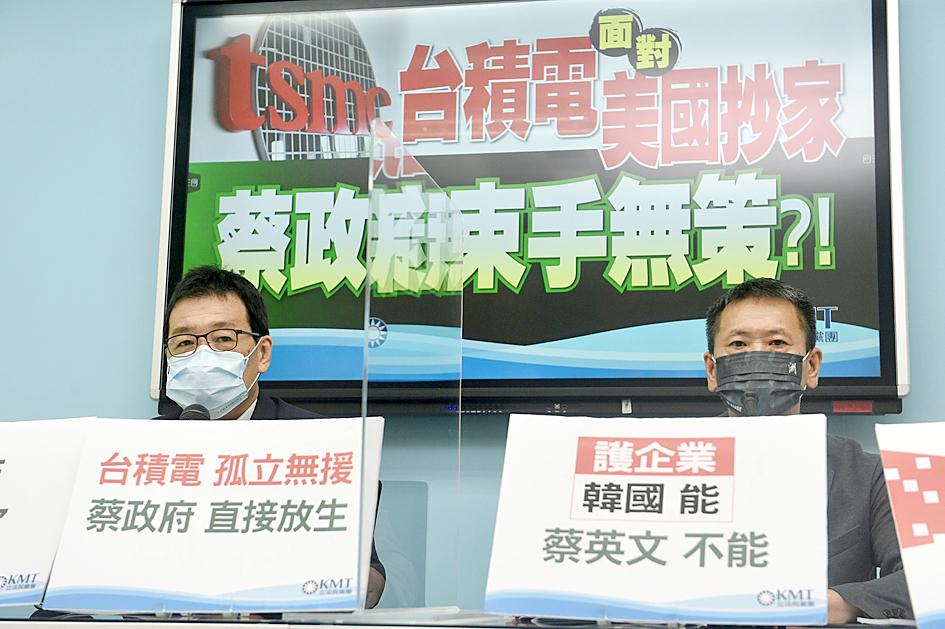The Chinese Nationalist Party (KMT) caucus yesterday accused President Tsai Ing-wen (蔡英文) of caving in to the US’ demand that Taiwan Semiconductor Manufacturing Co (TSMC) hand over confidential information.
The US Department of Commerce on Sept. 23 asked US and foreign semiconductor companies, including TSMC and South Korea’s Samsung Electronics Co, to provide information on chip inventory and sales within the next 45 days, media reports said.
US President Joe Biden’s administration is considering invoking the Defense Production Act to force companies to provide the information, the reports said.

Photo: George Tsorng, Taipei Times
US Secretary of Commerce Gina Raimondo was cited by Reuters as saying that the request for information on the chip crisis would strengthen supply chain transparency and that “other tools” would be brought to bear on companies that did not comply.
The Tsai administration and Minister of Economic Affairs Wang Mei-hua (王美花) are willing to sacrifice TSMC’s interests to comply with the US’ wishes, the KMT caucus told a news conference in Taipei.
Urging the Ministry of Foreign Affairs and the Ministry of Economic Affairs to lodge a protest with Washington, the caucus said it is prepared to bring its case to the Legislative Yuan.
The government should get tough with the US, as Washington’s actions contravene Article 2 of the Trade Secrets Act (營業秘密法), KMT Legislator William Tseng (曾銘宗) said.
“The government has to protect the Republic of China’s economic interests and those of TSMC’s 950,000 shareholders,” Tseng said.
Tsai should consider demanding that Intel also provide confidential information about its inventory if the US insists on demanding the same from TSMC, he said.
The US has repeatedly used the Sherman Antitrust Act and other legal mechanisms to force foreign industries to surrender trade secrets or technologies since the 1980s, KMT caucus whip Alex Fai (費鴻泰) said.
The use of such methods led to the downfall of Japanese companies Toshiba and Hitachi, he added.
Should TSMC give up confidential information about its manufacturing process, orders and inventory, it could lose its competitive edge, and its ability to act as the “sacred mountain guarding the nation,” he said.
Tsai is lying to the country about how Washington’s request would not hurt the chipmaker, Fai said, adding that the government would surely have rejected the request had it come from Beijing.
Tsai should not have prostrated the nation before the US or be indifferent to its unreasonable demands, he added.
“This shows that Tsai, Wang and the Democratic Progressive Party are cowards,” Fai said.
KMT Legislator Lin Wei-chou (林為洲) said that South Korea has reacted promptly by creating a committee with its semiconductor sector to put up a coordinated response to the US’ demands.
Taipei should follow Seoul’s example and not leave TSMC to fight Washington alone, Lin said.

Nipah virus infection is to be officially listed as a category 5 notifiable infectious disease in Taiwan in March, while clinical treatment guidelines are being formulated, the Centers for Disease Control (CDC) said yesterday. With Nipah infections being reported in other countries and considering its relatively high fatality rate, the centers on Jan. 16 announced that it would be listed as a notifiable infectious disease to bolster the nation’s systematic early warning system and increase public awareness, the CDC said. Bangladesh reported four fatal cases last year in separate districts, with three linked to raw date palm sap consumption, CDC Epidemic Intelligence

The manufacture of the remaining 28 M1A2T Abrams tanks Taiwan purchased from the US has recently been completed, and they are expected to be delivered within the next one to two months, a source said yesterday. The Ministry of National Defense is arranging cargo ships to transport the tanks to Taiwan as soon as possible, said the source, who is familiar with the matter. The estimated arrival time ranges from late this month to early next month, the source said. The 28 Abrams tanks make up the third and final batch of a total of 108 tanks, valued at about NT$40.5 billion

Two Taiwanese prosecutors were questioned by Chinese security personnel at their hotel during a trip to China’s Henan Province this month, the Mainland Affairs Council (MAC) said yesterday. The officers had personal information on the prosecutors, including “when they were assigned to their posts, their work locations and job titles,” MAC Deputy Minister and spokesman Liang Wen-chieh (梁文傑) said. On top of asking about their agencies and positions, the officers also questioned the prosecutors about the Cross-Strait Joint Crime-Fighting and Judicial Mutual Assistance Agreement, a pact that serves as the framework for Taiwan-China cooperation on combating crime and providing judicial assistance, Liang

A group from the Taiwanese Designers in Australia association yesterday represented Taiwan at the Midsumma Pride March in Melbourne. The march, held in the St. Kilda suburb, is the city’s largest LGBTQIA+ parade and the flagship event of the annual Midsumma Festival. It attracted more than 45,000 spectators who supported the 400 groups and 10,000 marchers that participated this year, the association said. Taiwanese Designers said they organized a team to march for Taiwan this year, joining politicians, government agencies, professionals and community organizations in showing support for LGBTQIA+ people and diverse communities. As the first country in Asia to legalize same-sex